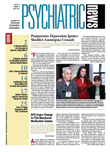The U.S. Food and Drug Administration (FDA) approved in May AstraZeneca's once-a-day formulation of its schizophrenia drug quetiapine (Seroquel) for the treatment of schizophrenia in adult patients.
The once-daily version is called Seroquel XR (quetiapine fumarate) extended-release tablets. It will become available during the latter half of 2007.
AstraZeneca said it developed Seroquel XR so that patients using Seroquel for schizophrenia would have a more convenient dosing than is the case with Seroquel, where a tablet has to be taken more than once a day.
FDA approval of Seroquel XR was based on a six-week, double-blind, randomized, placebo-controlled study investigating efficacy and safety in 573 patients experiencing acute exacerbations of schizophrenia. Subjects getting Seroquel XR received doses of 400 mg/day, 600 mg/day, or 800 mg/day.
Subjects were evaluated with the Positive and Negative Syndrome Scale (PANSS) at the start and end of the six-week study. The total PANSS score changes of the subjects receiving Seroquel SR were compared with the total PANSS score changes of the subjects getting a placebo.
Subjects receiving Seroquel XR showed a significant improvement in PANSS scores compared with subjects getting a placebo regardless of whether they received a dose of 400 mg/day, 600 mg/day, or 800 mg/day.
In a second analysis, the efficacy of Seroquel XR was evaluated based on changes in total PANSS scores over the six-week period, as well as on the basis of changes in individual schizophrenia symptoms—positive symptoms, negative symptoms, symptoms of general psychopathology, aggression, and depression—over that period.
Compared with placebo, Seroquel XR at all three doses led to a significant reduction in total PANSS scores, positive symptoms, symptoms of general psychopathology, and aggression. Compared with placebo, Seroquel XR at 600 mg/day or at 800 mg/day led to a significant reduction in negative symptoms and depression.
Seroquel XR was generally well tolerated in the trial. The most commonly observed adverse reactions were dry mouth, somnolence, dizziness, and dyspepsia.
“Clinical trial data demonstrate that Seroquel XR is a safe and effective treatment option for schizophrenia,” Charles Schulz, M.D., chair of psychiatry at the University of Minnesota, said in a press release issued by AstraZeneca.
According to the same press release, Seroquel XR is not approved for the treatment of patients with dementia-related psychosis. Elderly patients with dementia-related psychosis treated with second-generation antipsychotics such as Seroquel have been found to be at an increased risk of death compared with elderly patients taking a placebo.
Seroquel was included in the National Institute of Mental Healt h's CATIE (Clinical Antipsychotic Trials of Intervention Effectiveness) study (Psychiatric News, April 21, 2006). Seroquel has also been approved by the FDA to treat both the depressive and acute manic phases of bipolar disorder (Psychiatric News, December 1, 2006). ▪
